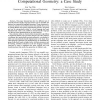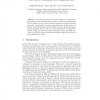273 search results - page 7 / 55 » Extensible Grammars for Language Specialization |
GRAMMARS
2002
13 years 7 months ago
2002
Recent models of natural language processing employ statistical reasoning for dealing with the ambiguity of formal grammars. In this approach, statistics, concerning the various li...
CSL
2006
Springer
13 years 7 months ago
2006
Springer
Grammar induction, also known as grammar inference, is one of the most important research areas in the domain of natural language processing. Availability of large corpora has enc...
HICSS
2007
IEEE
14 years 1 months ago
2007
IEEE
— This paper demonstrates how two different sets of powerful domain specific language features can be specified and deployed as composable language extensions. These extensions...
DSL
2009
13 years 5 months ago
2009
Abstract. Both XML and Lisp have demonstrated the utility of generic syntax for expressing tree-structured data. But generic languages do not provide the syntactic richness of cust...
MOZ
2004
Springer
14 years 25 days ago
2004
Springer
Abstract. Extensible Dependency Grammar (XDG) is a graph description language whose formulas can be solved by constraint programming. XDG is designed so as to yield a declarative a...


